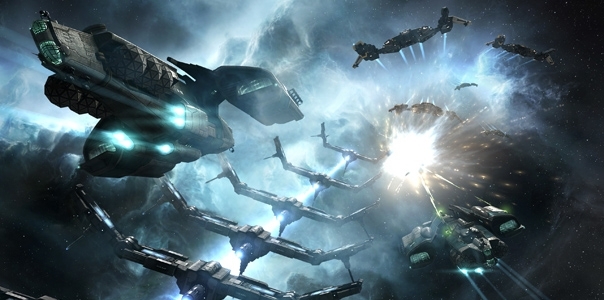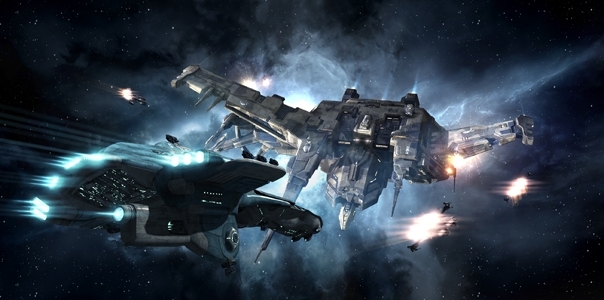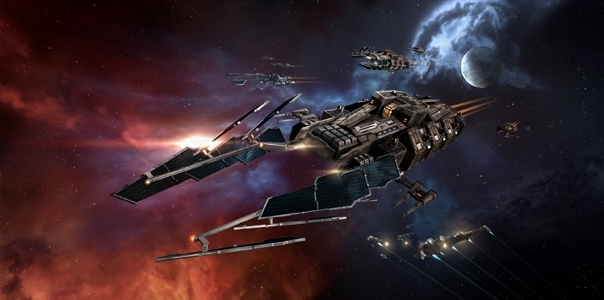12 Games of Christmas: EVE Online
In an exclusive interview, executive producer Jon Lander talks about what makes EVE Online successful, how expansions are built and what the future holds.

It’s that harsh side of EVE that can make the uninitiated feel nervous about trying the game. For Lander though, that element is essential. “I don’t want it to ever stop being a hard core difficult game; I just want people to be able to play that hard core difficulty a bit more easily, if that makes sense. It’s kind of like the ‘easy to learn, hard to master’ type of thing. But no, I don’t think EVE would be at all successful if it wasn’t possible for your actions to have real consequences.”
Looking out at the Icelandic landscape, Lander also told me how he feels that EVE Online reflects the country that gave rise to it. “I think the Icelanders found a way to take an incredibly dangerous, harsh, unforgiving landscape, but also show that it was somewhere where you could have a great amount of fun and a great sense of community, and actually a place that you could call home. And so I think EVE very much reflects that. I can’t see us ever going away from that, certainly not whilst I’m in charge of the game.”
 After launching last month, Lander described how well EVE’s latest expansion, Retribution, was doing. “This is probably the most successful expansion we’ve ever done, just from a numbers perspective, in the month after launch. It’s been incredibly good. Let me caveat it – it’s very early days yet, but we’ve seen a phenomenal response to it.”
After launching last month, Lander described how well EVE’s latest expansion, Retribution, was doing. “This is probably the most successful expansion we’ve ever done, just from a numbers perspective, in the month after launch. It’s been incredibly good. Let me caveat it – it’s very early days yet, but we’ve seen a phenomenal response to it.”
Some of those expansion features, such as the new dynamic sound system, were due to individuals on the development team developing new skills. “Jón [Hallur Haraldsson], he’s a great guy, one of things he wanted to do was start learning programming. And one thing that’s really hard to get is a good technical guy who is purely about programming in the sound engine, because it’s almost not a full-time job. He was finding that there were things he wasn’t able to do in the engine because we weren’t able to dedicate a person full-time to it. So, as a result of the fact that he was learning programming, and that we’re basically a Python shop, he started tinkering with it. And he suddenly found that by tweaking a few values here and there and exposing a bit more of the sound engine to the client, that he was able to make some really meaningful impact.”
It’s a story that Lander told me was repeated around CCP, with customer support people who have become great writers, QA guys who moved on to programming and producing, and more. It’s an almost unique situation, considering that some have been working on the game for over ten years. “We’ve had to keep our engine constantly evolving, so you don’t have that luxury of a person staying in the same job for seven years, because people tend to get a bit bored of that. So we’ve had to find ways of moving people through the organization in a way that makes sense for them and for us. I think the fact that we still have people who were part of the original thirty man gang who shipped EVE in 2003; I think it’s a model of how we’ve had to do our software and other development. Because unfortunately you don’t get to start from scratch every release, you’ve got to just build on top of what you have.”

On the subject of future updates, Lander suggested that they would be a mix of doing “cool new” things, as well as maintaining a “very old codebase”. For his team, 2012 has been a year of fixing bugs, adding new quality of life features and revamping existing mechanics in interesting ways. “After 2011, and the previous 8 or 9 years, we haven’t really done enough looking after the old pieces, and so it’s beginning to get a bit rickety and hard to work in. This year has been about how we tackle some really gnarly bits and pieces, maybe do some smaller releases, but really get our stuff together”
While there will always be some part of EVE’s expansions that updates legacy code, Lander singled out certain features for future revamp. Alongside finishing the work on the War Declaration system and updating the Mission system, Lander touched on player owned structures such as starbases. “The underlying code for that is horrible, it really has grown up as spaghetti over eight years, so that’s something that we’re looking at, and we’re considering where that best fits into our development plans.” He added that the cluster networking code had a “big spotlight thrown on it” as they continued to integrate the upcoming PS3 shooter Dust 514.
 Putting together new expansions is about more than just listing a set of features; it’s about giving them purpose, as Lander explained. “I think, as we go forward, we need to start looking at slightly more inspiring things that capture the imagination for our expansions. I think Retribution was a good step toward that. I think even if you’d never heard of EVE Online, you knew what a sci-fi bounty hunter was. We need to start coming up with quite cohesive themes so that our expansions are incredibly meaningful, rather than just saying ‘right, we’re going to rework whatever system now’.”
Putting together new expansions is about more than just listing a set of features; it’s about giving them purpose, as Lander explained. “I think, as we go forward, we need to start looking at slightly more inspiring things that capture the imagination for our expansions. I think Retribution was a good step toward that. I think even if you’d never heard of EVE Online, you knew what a sci-fi bounty hunter was. We need to start coming up with quite cohesive themes so that our expansions are incredibly meaningful, rather than just saying ‘right, we’re going to rework whatever system now’.”
“I think the real difference for me on Retribution was the whole concept behind the release was something that people could identify with, be it as an EVE veteran or somebody who’s never heard of EVE Online before. If you look to one of our other most successful releases, Apocrypha, back in 2009, it was basically about wormholes. Everyone who’s heard of Sci-fi- has heard of wormholes, and they can put their own spin on it. People were going ‘there’s this new unexplored scary space, we really want to have a part of that’. And I don’t think it’s a coincidence that when we start getting good themes of classical stories which people can actually relate to, that we have successful expansions.”

Also helping to grow that subscriber base was EVE’s launch into China earlier this year, supported by local partner TianCity. I asked Lander if the team had faced any particular challenges with bringing their MMO to such a unique culture. “The universe in EVE China, because of the various rules and regulations of running games in China, is a separate copy of the game; it’s the only copy of EVE out there. If you’re playing EVE Online and you’re not in China, you’re playing on the main server. If you’re in China unfortunately you have to be on your own copy of the world. We’d much rather it wasn’t that way, but thems the rules, so we’ve got to take it.”
Lander also told me how CCP and TianCity have been trading tips, with some of their suggestions being fed back into the game. “They have a huge experience in free-to-play gaming, and they give us some interesting insights, not in how to go free-to-play, but in the kind of things which make games more accessible. They gave us some really good tips on the first 20 minutes in game, which we’ve been taking and working on, and we also give them a lot of advice on how to develop communities.”
 “I think it’s very interesting to see how the communities have evolved in different ways out there. In null-sec space, which is where our players have the opportunity to do anything they want, that’s completely the wild west of their world, I think it’s been taken over by one or two alliances, whereas there are many alliances in null-sec space in Tranquility in the western server. So it’s interesting to compare notes with them, and we work very closely with TianCity. It’s a great market and it’s a great opportunity for us at CCP to be able to break into it.”
“I think it’s very interesting to see how the communities have evolved in different ways out there. In null-sec space, which is where our players have the opportunity to do anything they want, that’s completely the wild west of their world, I think it’s been taken over by one or two alliances, whereas there are many alliances in null-sec space in Tranquility in the western server. So it’s interesting to compare notes with them, and we work very closely with TianCity. It’s a great market and it’s a great opportunity for us at CCP to be able to break into it.”
As I thanked Lander for sharing his time during the holiday season, I reminded him about how busy his year ahead is, with the launch of Dust 514, EVE’s 10th anniversary, and further EVE Online expansions. He admitted that it’s going to be a hectic year for them, but also a momentous one. “This year we’ve actually pushed our FanFest back a little later; it’s actually happening at the end of April. We wanted to get it as close to May 6th as we possibly could, so that we could have all of the really hardcore EVE fans up in Reykjavik for it. The new venue that we have, Harpa, is a beautiful place right on the seafront in Reykjavik. That FanFest is going to be special, and we’ve got a lot of special things lined up for that, really for the players. We have players who come to FanFest and get an EVE tattoo. We’ve got really hardcore fans who love coming out here, and it’s great to spend three or four days with them and really sort of revel in everything EVE.”
Could there be anything else that CCP is planning to squeeze in? “The big bits that I’ll tell you now – there’s a huge calendar of things that we’ve got planned for 2013 and into 2014. We’ll be announcing more as we go through the build-up to FanFest, and then at FanFest itself we’ll be telling an awful lot more about the future of EVE, not just in 2013, but for the next 3, 5, 10, 15 years.”
Gareth “Gazimoff” Harmer, Senior Contributing Editor
10 Lords a Leaping (over a tall building in a single bound)
5 Gold Rings (and one to rule them all...)




